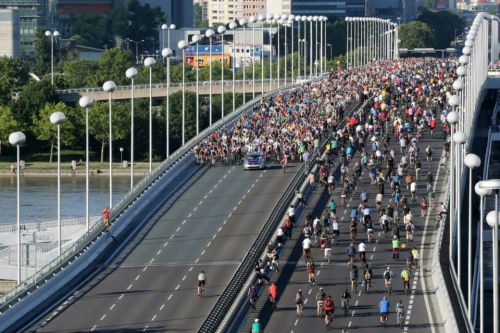By Tim Blumenthal, president of Bikes Belong
More than 1,400 government officials, business leaders, bike advocates and academics from some 50 nations gathered in Vienna, Austria, last week for global bike advocacy’s biggest annual policy and planning conference, Velo-city 2013 (http://velo-city2013.com/wp-content/uploads/May2013_factsheet_velo-city2...).
Members of the Bikes Belong and PeopleForBikes staff attended to learn about international best practices, talk about the progress of our Green Lane Project, and share lessons about effective industry involvement with the European Cycling Federation (ECF) and their fast-developing Cycling Industry Club.
A well-attended meeting of industry leaders convened by the ECF attracted leaders from Shimano, SRAM, Accell Group, Specialized, Pon (owner of Cervélo, Derby, Gazelle and Union Bicycles) as well as a variety of new players representing bike-sharing and bike parking companies. The goal is to get more companies involved and invested in a collective European bike-industry effort to support bike infrastructure and policy improvements.
The ECF also conducted a meeting to explore the concept of forming a global association of bike advocacy organizations and other non-government groups.
Randy Neufeld, the Chicago-based director of the SRAM Cycling Fund, delivered a spirited keynote address in which he talked about the role that the bike industry can play in improving cycling worldwide. Neufeld said that economic messages should be emphasized in discussions with elected officials, and he added that bike business leaders are well positioned to tell these stories.
Neufeld challenged the industry in Europe to become more engaged. He thanked the three-dozen companies who have already stepped up to support the Cycling Industry Club, founded in 2011 with the leaders of several big suppliers. It aims to tap into billions of euros of government funding for new cycling infrastructure throughout Europe.
Trends
Pinpointing key takeaways from a weeklong event with more than 300 unique sessions isn’t easy, but at least three key themes emerged from Vienna:
- The combination of bike-sharing systems and better bike infrastructure is a powerful force that continues to gain momentum throughout the developed world. Mayors from all over Europe took the stage at Velo-city to talk about the growth of bike riding in their cities and the important benefits that have followed. Two of the event’s biggest sponsors were major bike-sharing system providers: JCDecaux (that runs Velib in Paris) and Gewista (that manages CityBike Wien).
- More major, non-endemic corporations are getting involved in supporting and promoting cycling, with a special focus on city riding and short, practical trips. One of the lead conference sponsors was Spar, the international grocery and convenience chain that operates 12,500 stores in 35 countries. Spar Austria continues to promote a Bike & Buy project to motivate customers to arrive by bike and encourage its employees to commute by bike.
- Bike-sharing technology, bike parking, and high-tech systems that measure and (help legitimize) bike use are becoming big businesses. The conference expo was filled with companies working in these areas; many are new to the bike business and are well funded.
Vienna, with 1.7 million residents, doesn’t quite yet rank among the world’s best cities for cycling, but nearly 6 percent of all trips here are made by bike. That’s higher than any U.S. city of a million people or more, and it’s growing as the city works quickly to develop a comprehensive network of separated bikeways. Vienna is one of about 60 major cities in Europe to sign on to the Charter of Brussels that includes a commitment to reach 15 percent of all trips by bike.
The city is consistently touted for its exceptionally high quality of life. The famous Danube flows through its heart and the city is graced by hundreds of neo-Gothic buildings, wide tree-lined boulevards that now incorporate bikeways and big parks. Vienna now supports two ubiquitous, colorful bike-sharing systems.
Vienna seemed to fully embrace this conference with a variety of special events that included a mammoth bike tour of the entire city with 4,000 participants and an ambitious museum exhibit of bike design and culture at the MAK, the Austrian Museum of Applied Arts.




